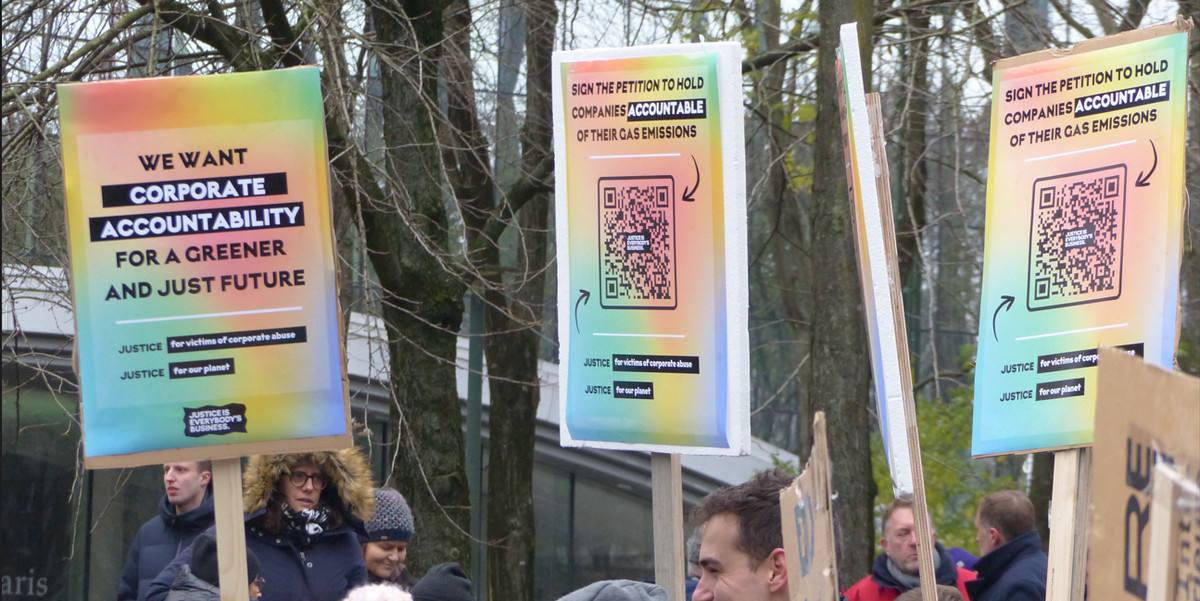Open letter
Ahead of what could be the final political trilogue negotiations on the EU Corporate Sustainability Due Diligence Directive (CSDDD), 93 human rights and environmental defenders and civil society organisations from the Global South have sent a letter to the Spanish Presidency of the European Union, as well as to EP Rapporteur Lara Wolters and Justice Commissioner Didier Reynders, calling for a directive that protects human rights and our planet first, beyond business as usual.
To:
Spanish Presidency of the Council of the European Union;
Rapporteur Lara Wolters,
Mr Didier Reynders, Commissioner for Justice.
Honourable decision-makers,
We write to you as defenders and advocates for those most affected by your proposed Corporate Sustainability Due Diligence Directive (CSDDD). As Global South signatories, we represent and convey the voices of those suffering the most from irresponsible business activity, including Indigenous peoples and workers at the end of global value chains. Ahead of what may be the final negotiations on CSDDD, we request that you hear our call for a directive that protects human rights and our planet first beyond “business as usual”.
- Protect our Rights and the Environment
Restrictions on the protection of our rights will enable ongoing harm to us to continue and must be removed. In particular, we again call on you not to exclude Indigenous Rights, nor key ILO and other international instruments on the rights of workers, human rights defenders and environmental protection. Recognising our dependence as humans on the natural environment for food, health, and livelihoods, and its spiritual significance for many of us, we stress the dire threat to our planet’s ecological integrity. Protecting our life support systems – water, soil, forests and air – is essential. The CSDDD must ensure the broadest environmental protection possible to counter ever increasing business-driven ecological destruction. - Protect our Climate and our Future
While humanity is on track to reach a disastrous 3ºC warming by 2050, climate change is already causing severe harm to people, the environment and the economy, with particularly disastrous consequences for marginalised groups, such as Indigenous Peoples and women. Businesses play a major role in driving up greenhouse gas emissions. The CSDDD must require companies to effectively implement strong transition plans with time-bound targets for scope 1, 2 and 3 emissions. The inclusion of the Paris Agreement as well as the ability of rights holders to take companies to court is nothing short of an absolute necessity. - Defend our Rights and Access to Justice
Restricting civil liability to harm that has been ‘caused to a natural or legal person’ and only where there is an aim ‘to protect the natural or legal person’ means our group – including indigenous – rights are excluded. Workers in global value chains face the systematic trampling of their rights, including violent intimidations and union busting and widespread, serious restrictions to collective bargaining. For us to have any hope of actually defending our rights, all access to justice measures (recommended by the EU Fundamental Rights Agency in 2017, 2021 and 2023 together with the European Law Institute) must be adhered to. For us, justice depends on it. - Make sure we are taken into account – meaningful and safe stakeholder engagement
Our voices continue to be ignored when companies make business decisions that affect us even though we are the ones most at risk for raising issues around irresponsible business activity. Ensure our voices are taken into account when companies are making decisions that affect our lives and livelihoods, recognise the role of trade unions and worker representatives and protect us from reprisals and retaliations when denouncing business-related human rights and environmental violations. Including an obligation on companies to conduct meaningful and safe stakeholder engagement at all stages of the due diligence process will result in tailored and effective prevention, mitigation, and remediation of adverse impacts as well as protection of human rights defenders. - Ensure obligations for all those who cause harm
It is beyond dispute that EU banks, insurers, investors and asset managers are involved in severe adverse impacts on our human rights, environment and climate, while our global financial system is set up to prioritise yielding dividends at the expense of investing in safety and security measures. By excluding the financial sector you condemn us to these ongoing and future adverse impacts. It is unjustifiable. For our protection, meaningful due diligence obligations must apply to the entire financial sector. Because of their inherent limitations, the use of third-party audits and industry initiatives cannot be automatically considered equivalent to appropriate due diligence measures. Auditors should be held accountable for the harms caused by faulty auditing.
In conclusion, we urgently call upon you as EU policy makers to champion a legislation that places human rights, environmental preservation, and climate resilience at its core. The final trialogue is the last chance to elevate the directive to a standard that not only prevents harm but actively contributes to a sustainable, equitable future. Let this be a testament to the EU’s unwavering dedication to human rights and its steadfast resolve to combat climate change on the global stage. The world is watching, and the choices made today will resonate for generations to come.
NB: The full list of signatories from Global South countries and supporting organisations, including CIDSE, can be found in the PDF versions of this open letter.
Cover photo credit: CIDSE

